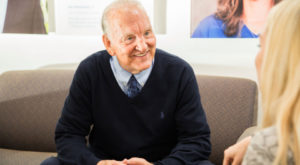
Jerry Hildebrand, director of Lynn’s Social Impact Lab, is a legend in the field.
Regular readers of this blog know that I have been a longtime fan of Lynn University and its visionary President Dr. Kevin Ross.
Last week, reminded me why.
Not a day goes by that we don’t see an article questioning the future of higher education. Colleges and universities are being disrupted, their business models challenged and now even admissions processes are being questioned in the wake of a recent national scandal.
But at Lynn University, we are witnessing a school that is pivoting with the times, riding the wave of change adeptly and becoming more relevant with every passing year.
Last week, I had the privilege of moderating a session at Lynn University’s first ever “Business for Good” conference hosted by Lynn’s new Social Impact Lab. I’m honored to be on the founding board of the lab which is run by a legend in the field: Jerry Hildebrand.
The conference brought together social entrepreneurs, business leaders, non-profit executives, students and investors anxious to learn how they can make a positive difference in the world.
As one of the keynote speakers Ron Cordes of the Cordes Foundation noted: it’s possible to invest capital and make a difference while making a profit too.
That’s a simple concept but a game changing shift in mindset.
I moderated a panel featuring two women who are reshaping the field of impact investing.
Kristin Fafard of Community Capital Management is the chief investment officer for a $2 billion plus fund that invests in affordable housing, clean water and other projects that provide both a return on capital and social impact. In fact, investors in her funds receive two reports—one chronicling financial performance and the other detailing the difference the fund’s capital is making in the community.
Community Capital is headquartered in Fort Lauderdale but has offices in the south and northeast. Since its inception 20 years ago, the firm has invested over $9 billion in impact initiatives nationwide.
From creating affordable housing to restoring the Everglades, Community Capital Management is in the vanguard of impact investing, a growing field.
Joining Kristin on the panel was a talented social entrepreneur named Lauren Harper, the founding director of Social Ventures Partners Miami, which is part of a philanthropic network with more than 39 affiliates in 9 countries and over 3,400 partners making SVP the largest network of engaged donors in the world.
We had a great conversation on how impact investing works and how communities and organizations can tie into the movement.
It was part of a day that brought a who’s who of players in the field to Boca Raton.
Here’s just a few of the stars who spent time at Lynn last week: the aforementioned Ron Cordes of the Cordes Foundation who chairs Lynn’s Social Impact Lab, Paul Rice, founder and CEO of Fair Trade USA, Eric Glustrom, CEO and Founder of the innovative Watson Institute (which now has an office on the Lynn campus), Eric Stephenson of Align Impact, Steve Fox of Impact Global Education, Felice Gorordo, CEO of Emerge Americas and a slew of other superstars in the impact investing and entrepreneurial worlds.
That all of these players—worldwide influencers—were gathered at Lynn is extremely significant and very exciting.
Lynn sees itself as a convener—which is a great role for a university to play—leading conversations around important topics and emerging opportunities.
Lynn’s new Social Impact Lab, includes event space and co-working opportunities giving both students and the community a place to gather, interact, collaborate and create. I had a chance to meet some really interesting students last week some of whom have ideas for social enterprises or businesses that have as part of their DNA plans to give back.
One student, Raymond Francois, is an aspiring food entrepreneur who is a Coast Guard veteran. As part of Lynn’s Social Impact Lab, Mr. Francois was able to travel to Macedonia where he worked with locals on community projects. The experience was life changing. As a result, his post grad plans include a business that would bring healthy food to underserved local neighborhoods. That’s very cool.
By investing in the next generation of game changers and opening a world of possibilities to their students, Lynn University guarantees against disruption and positions itself for years of success.
That this exciting world is happening on Military Trail ought to make all us very proud and excited about the future.
